Ethical Considerations in Human Research: The Belmont Report
VerifiedAdded on 2022/08/18
|6
|1228
|21
Essay
AI Summary
This essay provides an overview of the Belmont Report, focusing on its role in establishing ethical guidelines for research involving human subjects. The report, issued in 1978, outlines three core principles: respect for persons, beneficence, and justice. The essay examines how these principles are applied in practice, including informed consent, risk-benefit assessment, and subject selection. It also discusses the necessity of regulatory protections for human subjects and addresses challenges associated with the report's implementation, such as obtaining consent from vulnerable populations and managing research in emergency situations. The essay highlights the importance of the Belmont Report in protecting individuals from potential harm and ensuring ethical and legal standards in health and behavioral research. It concludes by emphasizing the report's significance in minimizing risks and promoting ethical conduct throughout the research process. The essay uses journal articles to support the discussion.

The Belmont Report
[Type the document subtitle]
SystemJP
[Pick the date]
[Type the document subtitle]
SystemJP
[Pick the date]
Paraphrase This Document
Need a fresh take? Get an instant paraphrase of this document with our AI Paraphraser
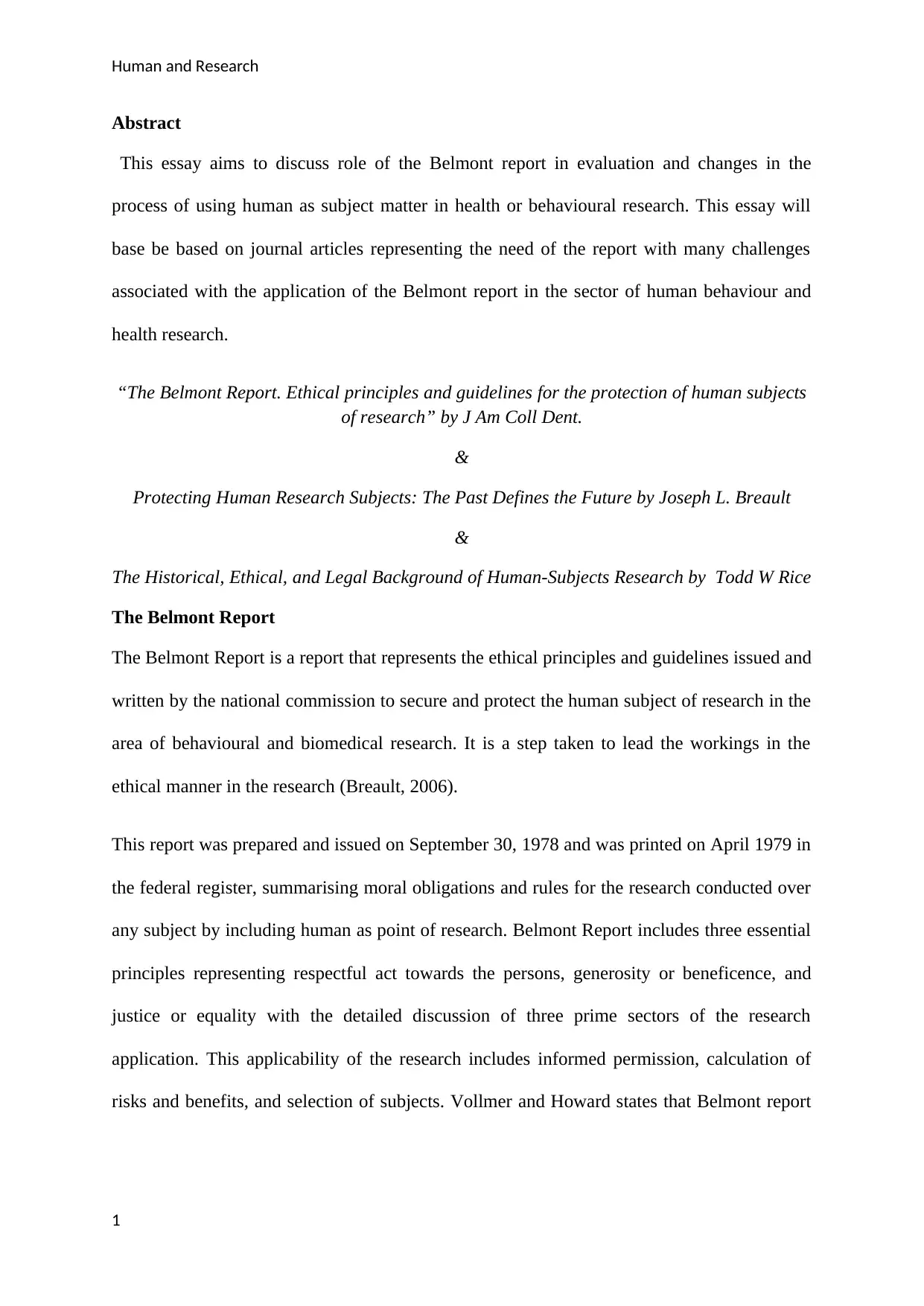
Human and Research
Abstract
This essay aims to discuss role of the Belmont report in evaluation and changes in the
process of using human as subject matter in health or behavioural research. This essay will
base be based on journal articles representing the need of the report with many challenges
associated with the application of the Belmont report in the sector of human behaviour and
health research.
“The Belmont Report. Ethical principles and guidelines for the protection of human subjects
of research” by J Am Coll Dent.
&
Protecting Human Research Subjects: The Past Defines the Future by Joseph L. Breault
&
The Historical, Ethical, and Legal Background of Human-Subjects Research by Todd W Rice
The Belmont Report
The Belmont Report is a report that represents the ethical principles and guidelines issued and
written by the national commission to secure and protect the human subject of research in the
area of behavioural and biomedical research. It is a step taken to lead the workings in the
ethical manner in the research (Breault, 2006).
This report was prepared and issued on September 30, 1978 and was printed on April 1979 in
the federal register, summarising moral obligations and rules for the research conducted over
any subject by including human as point of research. Belmont Report includes three essential
principles representing respectful act towards the persons, generosity or beneficence, and
justice or equality with the detailed discussion of three prime sectors of the research
application. This applicability of the research includes informed permission, calculation of
risks and benefits, and selection of subjects. Vollmer and Howard states that Belmont report
1
Abstract
This essay aims to discuss role of the Belmont report in evaluation and changes in the
process of using human as subject matter in health or behavioural research. This essay will
base be based on journal articles representing the need of the report with many challenges
associated with the application of the Belmont report in the sector of human behaviour and
health research.
“The Belmont Report. Ethical principles and guidelines for the protection of human subjects
of research” by J Am Coll Dent.
&
Protecting Human Research Subjects: The Past Defines the Future by Joseph L. Breault
&
The Historical, Ethical, and Legal Background of Human-Subjects Research by Todd W Rice
The Belmont Report
The Belmont Report is a report that represents the ethical principles and guidelines issued and
written by the national commission to secure and protect the human subject of research in the
area of behavioural and biomedical research. It is a step taken to lead the workings in the
ethical manner in the research (Breault, 2006).
This report was prepared and issued on September 30, 1978 and was printed on April 1979 in
the federal register, summarising moral obligations and rules for the research conducted over
any subject by including human as point of research. Belmont Report includes three essential
principles representing respectful act towards the persons, generosity or beneficence, and
justice or equality with the detailed discussion of three prime sectors of the research
application. This applicability of the research includes informed permission, calculation of
risks and benefits, and selection of subjects. Vollmer and Howard states that Belmont report
1
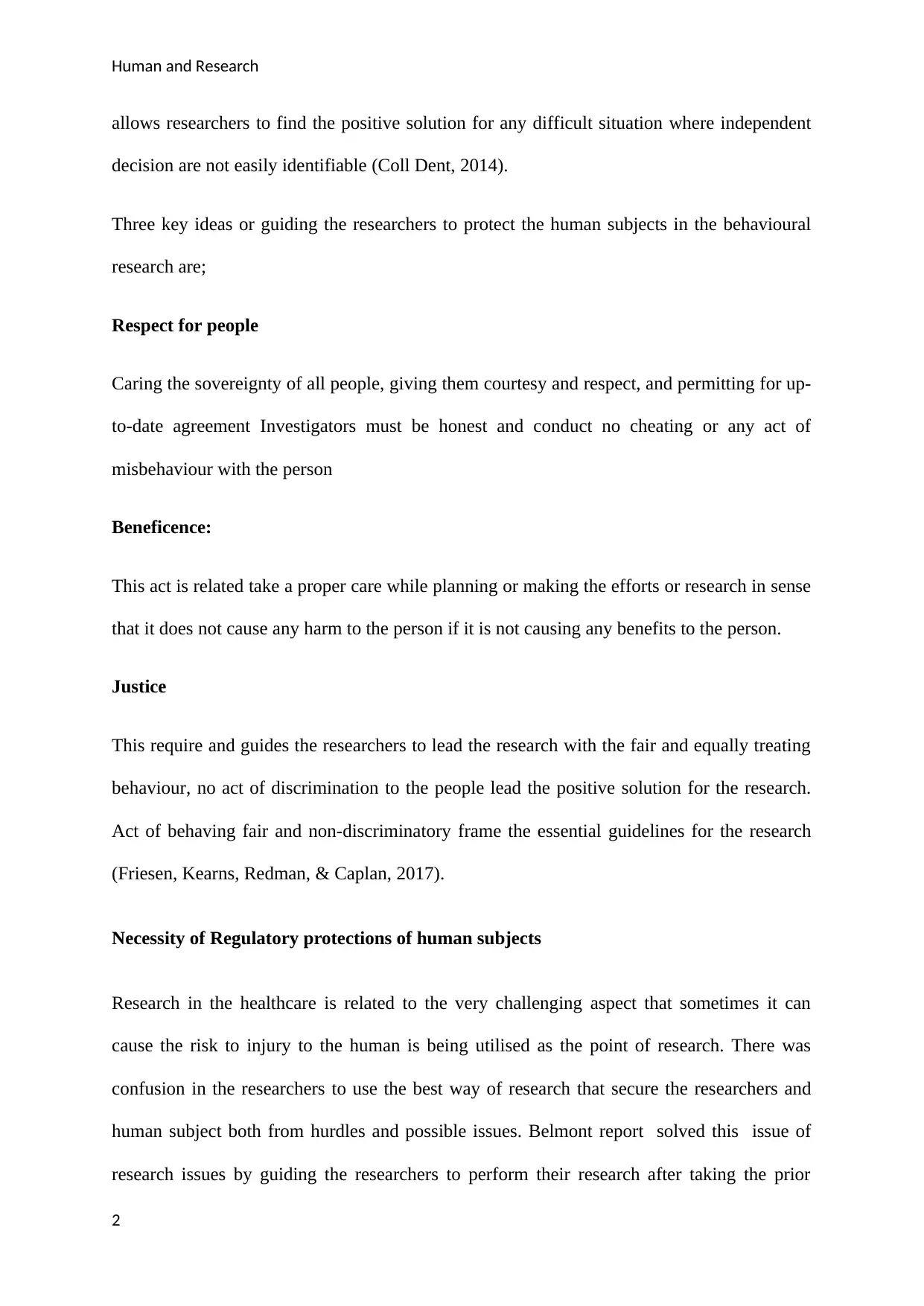
Human and Research
allows researchers to find the positive solution for any difficult situation where independent
decision are not easily identifiable (Coll Dent, 2014).
Three key ideas or guiding the researchers to protect the human subjects in the behavioural
research are;
Respect for people
Caring the sovereignty of all people, giving them courtesy and respect, and permitting for up-
to-date agreement Investigators must be honest and conduct no cheating or any act of
misbehaviour with the person
Beneficence:
This act is related take a proper care while planning or making the efforts or research in sense
that it does not cause any harm to the person if it is not causing any benefits to the person.
Justice
This require and guides the researchers to lead the research with the fair and equally treating
behaviour, no act of discrimination to the people lead the positive solution for the research.
Act of behaving fair and non-discriminatory frame the essential guidelines for the research
(Friesen, Kearns, Redman, & Caplan, 2017).
Necessity of Regulatory protections of human subjects
Research in the healthcare is related to the very challenging aspect that sometimes it can
cause the risk to injury to the human is being utilised as the point of research. There was
confusion in the researchers to use the best way of research that secure the researchers and
human subject both from hurdles and possible issues. Belmont report solved this issue of
research issues by guiding the researchers to perform their research after taking the prior
2
allows researchers to find the positive solution for any difficult situation where independent
decision are not easily identifiable (Coll Dent, 2014).
Three key ideas or guiding the researchers to protect the human subjects in the behavioural
research are;
Respect for people
Caring the sovereignty of all people, giving them courtesy and respect, and permitting for up-
to-date agreement Investigators must be honest and conduct no cheating or any act of
misbehaviour with the person
Beneficence:
This act is related take a proper care while planning or making the efforts or research in sense
that it does not cause any harm to the person if it is not causing any benefits to the person.
Justice
This require and guides the researchers to lead the research with the fair and equally treating
behaviour, no act of discrimination to the people lead the positive solution for the research.
Act of behaving fair and non-discriminatory frame the essential guidelines for the research
(Friesen, Kearns, Redman, & Caplan, 2017).
Necessity of Regulatory protections of human subjects
Research in the healthcare is related to the very challenging aspect that sometimes it can
cause the risk to injury to the human is being utilised as the point of research. There was
confusion in the researchers to use the best way of research that secure the researchers and
human subject both from hurdles and possible issues. Belmont report solved this issue of
research issues by guiding the researchers to perform their research after taking the prior
2
⊘ This is a preview!⊘
Do you want full access?
Subscribe today to unlock all pages.

Trusted by 1+ million students worldwide
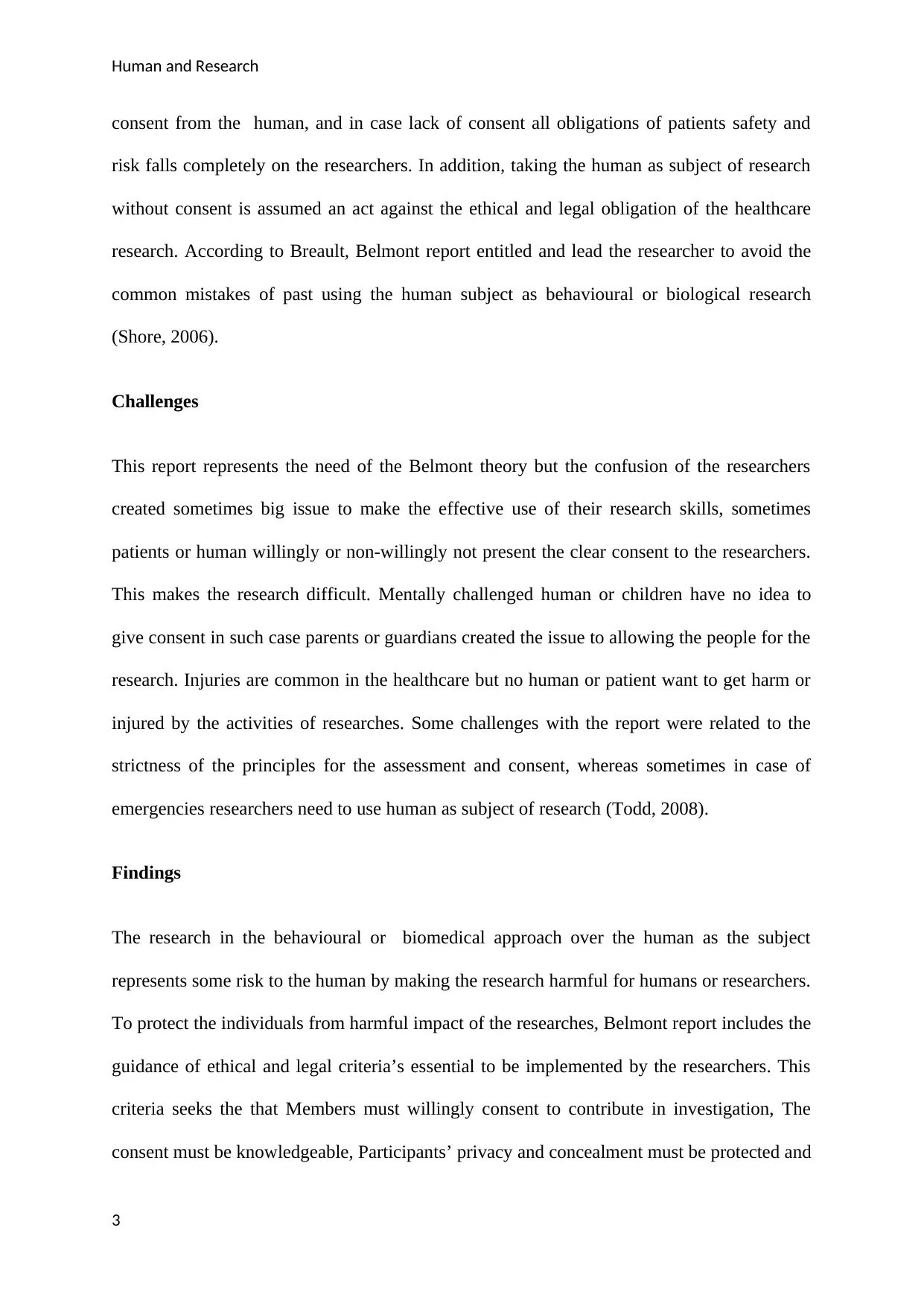
Human and Research
consent from the human, and in case lack of consent all obligations of patients safety and
risk falls completely on the researchers. In addition, taking the human as subject of research
without consent is assumed an act against the ethical and legal obligation of the healthcare
research. According to Breault, Belmont report entitled and lead the researcher to avoid the
common mistakes of past using the human subject as behavioural or biological research
(Shore, 2006).
Challenges
This report represents the need of the Belmont theory but the confusion of the researchers
created sometimes big issue to make the effective use of their research skills, sometimes
patients or human willingly or non-willingly not present the clear consent to the researchers.
This makes the research difficult. Mentally challenged human or children have no idea to
give consent in such case parents or guardians created the issue to allowing the people for the
research. Injuries are common in the healthcare but no human or patient want to get harm or
injured by the activities of researches. Some challenges with the report were related to the
strictness of the principles for the assessment and consent, whereas sometimes in case of
emergencies researchers need to use human as subject of research (Todd, 2008).
Findings
The research in the behavioural or biomedical approach over the human as the subject
represents some risk to the human by making the research harmful for humans or researchers.
To protect the individuals from harmful impact of the researches, Belmont report includes the
guidance of ethical and legal criteria’s essential to be implemented by the researchers. This
criteria seeks the that Members must willingly consent to contribute in investigation, The
consent must be knowledgeable, Participants’ privacy and concealment must be protected and
3
consent from the human, and in case lack of consent all obligations of patients safety and
risk falls completely on the researchers. In addition, taking the human as subject of research
without consent is assumed an act against the ethical and legal obligation of the healthcare
research. According to Breault, Belmont report entitled and lead the researcher to avoid the
common mistakes of past using the human subject as behavioural or biological research
(Shore, 2006).
Challenges
This report represents the need of the Belmont theory but the confusion of the researchers
created sometimes big issue to make the effective use of their research skills, sometimes
patients or human willingly or non-willingly not present the clear consent to the researchers.
This makes the research difficult. Mentally challenged human or children have no idea to
give consent in such case parents or guardians created the issue to allowing the people for the
research. Injuries are common in the healthcare but no human or patient want to get harm or
injured by the activities of researches. Some challenges with the report were related to the
strictness of the principles for the assessment and consent, whereas sometimes in case of
emergencies researchers need to use human as subject of research (Todd, 2008).
Findings
The research in the behavioural or biomedical approach over the human as the subject
represents some risk to the human by making the research harmful for humans or researchers.
To protect the individuals from harmful impact of the researches, Belmont report includes the
guidance of ethical and legal criteria’s essential to be implemented by the researchers. This
criteria seeks the that Members must willingly consent to contribute in investigation, The
consent must be knowledgeable, Participants’ privacy and concealment must be protected and
3
Paraphrase This Document
Need a fresh take? Get an instant paraphrase of this document with our AI Paraphraser
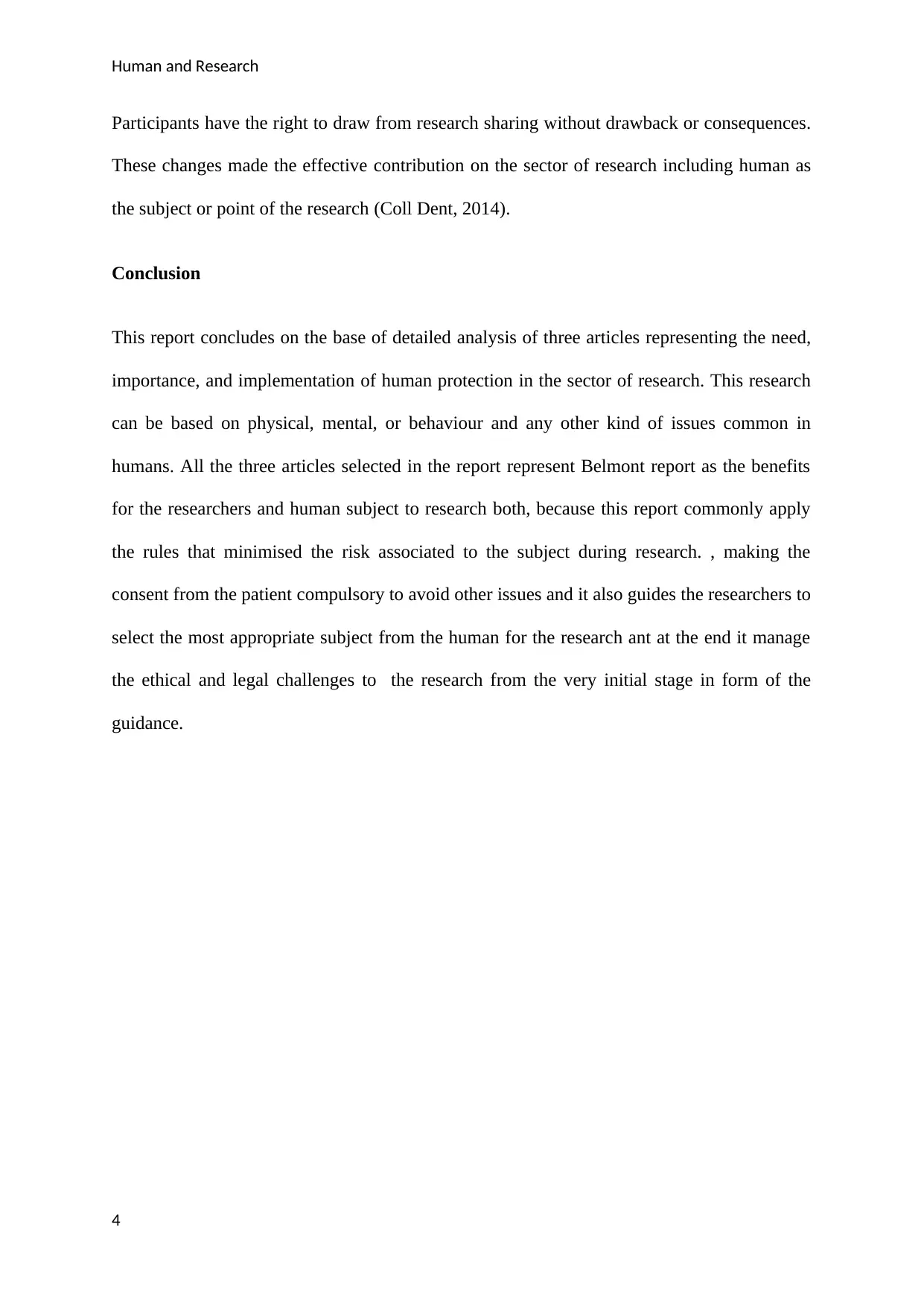
Human and Research
Participants have the right to draw from research sharing without drawback or consequences.
These changes made the effective contribution on the sector of research including human as
the subject or point of the research (Coll Dent, 2014).
Conclusion
This report concludes on the base of detailed analysis of three articles representing the need,
importance, and implementation of human protection in the sector of research. This research
can be based on physical, mental, or behaviour and any other kind of issues common in
humans. All the three articles selected in the report represent Belmont report as the benefits
for the researchers and human subject to research both, because this report commonly apply
the rules that minimised the risk associated to the subject during research. , making the
consent from the patient compulsory to avoid other issues and it also guides the researchers to
select the most appropriate subject from the human for the research ant at the end it manage
the ethical and legal challenges to the research from the very initial stage in form of the
guidance.
4
Participants have the right to draw from research sharing without drawback or consequences.
These changes made the effective contribution on the sector of research including human as
the subject or point of the research (Coll Dent, 2014).
Conclusion
This report concludes on the base of detailed analysis of three articles representing the need,
importance, and implementation of human protection in the sector of research. This research
can be based on physical, mental, or behaviour and any other kind of issues common in
humans. All the three articles selected in the report represent Belmont report as the benefits
for the researchers and human subject to research both, because this report commonly apply
the rules that minimised the risk associated to the subject during research. , making the
consent from the patient compulsory to avoid other issues and it also guides the researchers to
select the most appropriate subject from the human for the research ant at the end it manage
the ethical and legal challenges to the research from the very initial stage in form of the
guidance.
4
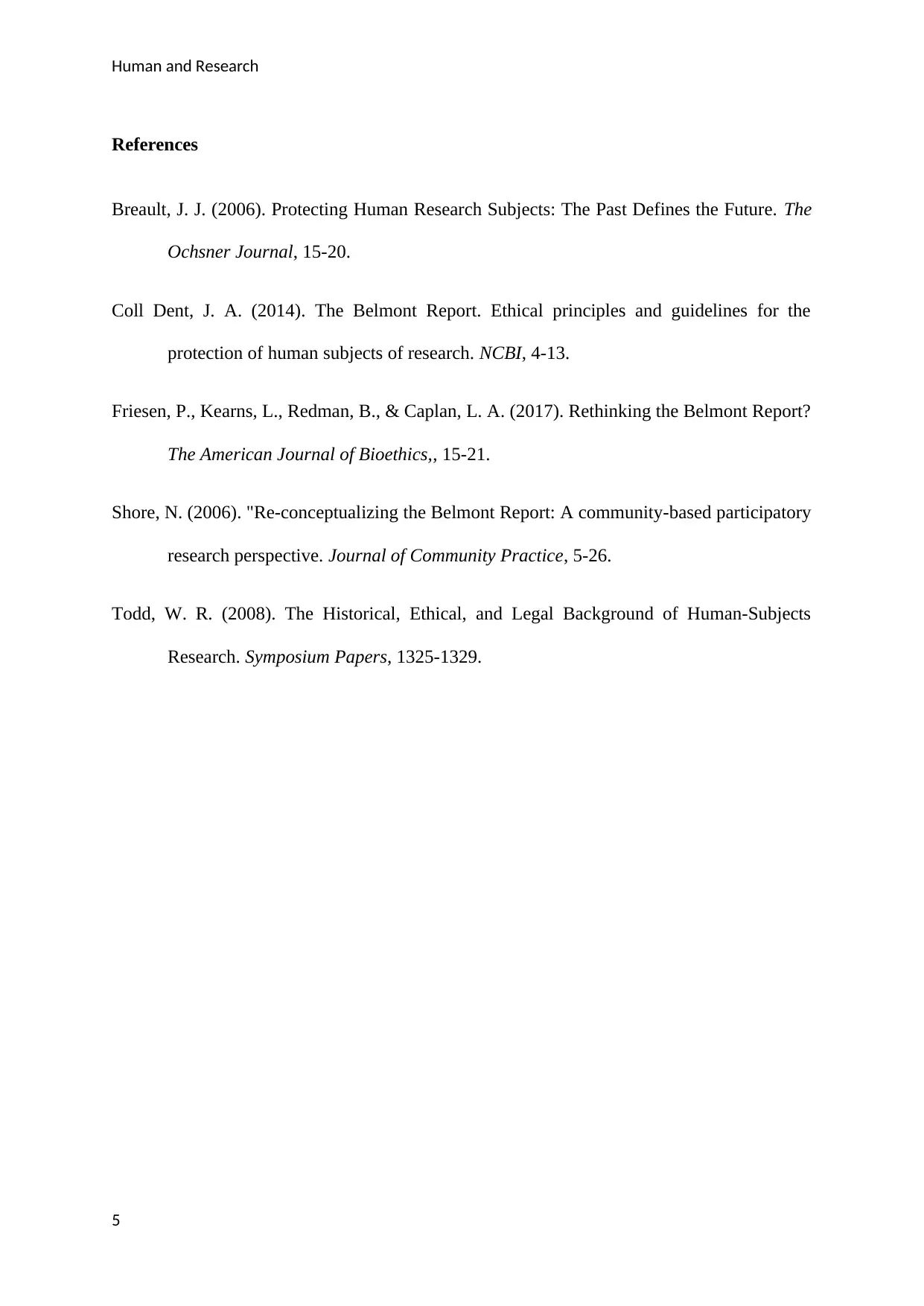
Human and Research
References
Breault, J. J. (2006). Protecting Human Research Subjects: The Past Defines the Future. The
Ochsner Journal, 15-20.
Coll Dent, J. A. (2014). The Belmont Report. Ethical principles and guidelines for the
protection of human subjects of research. NCBI, 4-13.
Friesen, P., Kearns, L., Redman, B., & Caplan, L. A. (2017). Rethinking the Belmont Report?
The American Journal of Bioethics,, 15-21.
Shore, N. (2006). "Re-conceptualizing the Belmont Report: A community-based participatory
research perspective. Journal of Community Practice, 5-26.
Todd, W. R. (2008). The Historical, Ethical, and Legal Background of Human-Subjects
Research. Symposium Papers, 1325-1329.
5
References
Breault, J. J. (2006). Protecting Human Research Subjects: The Past Defines the Future. The
Ochsner Journal, 15-20.
Coll Dent, J. A. (2014). The Belmont Report. Ethical principles and guidelines for the
protection of human subjects of research. NCBI, 4-13.
Friesen, P., Kearns, L., Redman, B., & Caplan, L. A. (2017). Rethinking the Belmont Report?
The American Journal of Bioethics,, 15-21.
Shore, N. (2006). "Re-conceptualizing the Belmont Report: A community-based participatory
research perspective. Journal of Community Practice, 5-26.
Todd, W. R. (2008). The Historical, Ethical, and Legal Background of Human-Subjects
Research. Symposium Papers, 1325-1329.
5
⊘ This is a preview!⊘
Do you want full access?
Subscribe today to unlock all pages.

Trusted by 1+ million students worldwide
1 out of 6
Related Documents
Your All-in-One AI-Powered Toolkit for Academic Success.
+13062052269
info@desklib.com
Available 24*7 on WhatsApp / Email
![[object Object]](/_next/static/media/star-bottom.7253800d.svg)
Unlock your academic potential
Copyright © 2020–2026 A2Z Services. All Rights Reserved. Developed and managed by ZUCOL.





